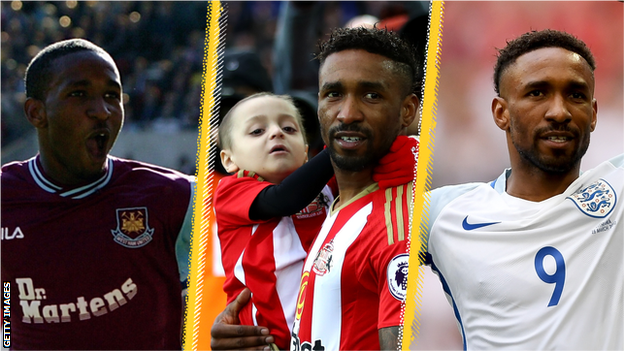Jermain Defoe: BBC Sport looks at defining moments of former West Ham, Tottenham & England forward's career
- Published

Jermain Defoe is the ninth highest goalscorer in Premier League history
Jermain Defoe's retirement sees him call time on an eventful 22-year professional career taking in 762 club games, a stint in Major League Soccer and 57 England caps.
A teenage prodigy at Charlton, Defoe became a goalscorer of note at West Ham and went on to enjoy a prolific two decades.
During that time his success as a footballer was accompanied by family tragedies and his friendship with terminally ill Sunderland fan Bradley Lowery, who died aged six after a long cancer illness in 2017.
He went on to remarkably win a first league title at Rangers in 2021 at the age of 38, and was in his second spell at Sunderland when he decided to hang up his boots.
But how will the 39-year-old, who is the ninth highest scorer in Premier League history, be best remembered?
Tipped for stardom
Defoe's early promise saw him join Charlton from Sunday League team Senrab whose former players include Lee Bowyer, John Terry, Ashley Cole and Ledley King.
But after briefly attending the FA national school at Lilleshall, he elected to join West Ham in 1999 with Charlton receiving about £1.4m for a player who had been tipped for stardom.
Defoe scored 18 league goals in 29 appearances during his first spell at Bournemouth
Defoe scored on his first-team debut for the Hammers in a League Cup tie against Walsall in September 2000, and he shot to national attention after joining Bournemouth on loan in the Second Division, scoring in 10 successive Football League games to equal a league record.
Making his Hammers breakthrough
On his return to West Ham, Defoe helped the club to a seventh-place Premier League finish in 2001-02, and his 14 goals in 39 matches in all competitions saw him end the campaign as the Hammers' top scorer.
He followed that up with 26 goals over the next two seasons to earn England recognition, but was vilified by some supporters for handing in a transfer request immediately after their relegation in 2003 and for his £7m move to Tottenham during 2003-04.
Michael Carrick, Joe Cole and Paolo di Canio were all part of the West Ham squad to be relegated with Defoe
Defoe made his England debut in a 1-0 defeat by Sweden in March 2004
Defoe marked his arrival at Tottenham with a goal on his debut in a 4-3 home win over Portsmouth, a club he would join four years later after ending his first spell at Spurs with 64 goals in all competitions.
Harry's man and more goals
After growing frustrated at playing second fiddle to Dimitar Berbatov and Robbie Keane at Spurs, Defoe linked up with his former West Ham boss Harry Redknapp at Portsmouth.
It proved a prosperous partnership with the forward scoring 17 goals in 36 games at Pompey to earn a move back to Spurs, two months after Redknapp's appointment as manager.
Defoe helped Spurs to four top-five finishes between 2009-2013
Defoe's five goals for Spurs in their 9-1 win over Wigan brought up a notable milestone
In his first full season back in London Defoe enjoyed his best return for Spurs scoring 24 goals in 43 games, and in the following campaign his five-goal haul against Wigan equalled the record for most goals in a Premier League game by a single player.
However, by 2014 he was ready for a lucrative £6m move to MLS side Toronto FC.
Defoe scored 12 goals in 21 games for Toronto FC
His spell across the Atlantic did not last long, with the forward moving to Sunderland in January 2015.
Family tragedy and little Bradley
Defoe's playing career has been punctuated by several tragic occurrences off the pitch.
In April 2009 his 26-year-old half brother Jade Defoe died of head injuries following an assault in Leytonstone, then his father Jimmy died of cancer in June 2012 while the player was preparing with England for the European Championships.
Defoe has openly spoken about his special relationship with Bradley Lowery
While he was a prominent international, Defoe was also best known for his relationship with terminally ill Sunderland fan Bradley Lowery.
His work through the Jermain Defoe Foundation also brought him an OBE in 2018 for services to charity.
Bowing out in style - and with more goals
Defoe's final England goal came in a 2-0 win over Lithuania in 2017
The concluding years of Defoe's career saw him return to Bournemouth before he moved to the Scottish Premiership with Rangers in 2019 on an initial loan deal, winning his first league title with the Gers in 2020-21.
But another sentimental switch, back to Sunderland in League One, did not bring a fairytale conclusion.
Defoe helped Rangers to be crowned champions of Scotland for the first time in 10 years
Who were the real Peaky Blinders?: Explore the origins of this mass gang movement
The rise of the American far right: Louis Theroux meets the movement's key figures